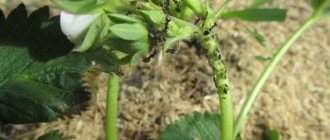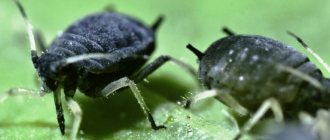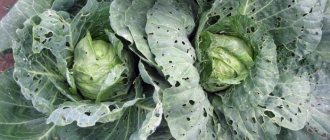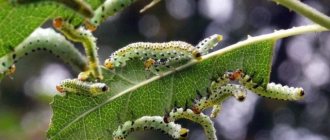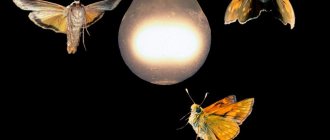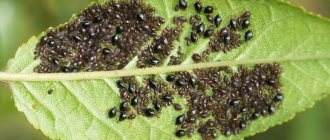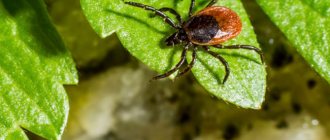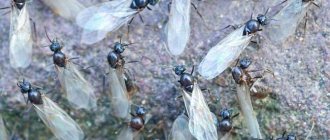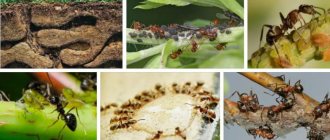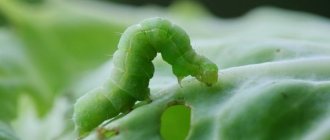The fight against aphids on roses can last the entire season and be carried out with varying success, because getting rid of these insects for good is almost impossible. However, there are methods that allow you to reduce the number of treatments and calmly enjoy the blooming of roses.
Experienced gardeners do not wait for characteristic marks to appear on the leaves, but carry out the first treatment against aphids in the spring, that is, they are proactive. But once, alas, is not enough, depending on the chosen product, you will have to repeat the steps from 3 to 7-9 times.
The first sign of aphids is an abundance of ants scurrying along the rose stems
Why are aphids dangerous for roses?
Aphids are a pest whose goal is to destroy the rose. The insect multiplies quickly, conquering more and more territory on the plant.
There are several significant signs by which it is easy to determine whether a flower is affected by aphids:
- ants actively crawl on the plant;
- the leaf blade becomes thinner;
- the rose looks lifeless.
Aphids suck all the nutritious juices from the bush. Deformation of the tips of the shoots and the buds themselves occurs. The leaves curl, turn yellow and fall off. The pest secretes a sweet liquid. The viscous secretion literally attracts ants with its taste, which come running to feast on it.
These green midges cause serious damage to rose bushes:
- Green aphids spoil the appearance of roses and are carriers of various diseases.
- The sweetish liquid that insects secrete serves as a breeding ground for the destructive fungus.
- Females give birth to about 200 individuals every two weeks, and quickly multiply the colony.
- Aphids are a danger to many crops and can destroy an entire garden.
Gardeners with many years of experience are confident that this pest is a carrier of many phytopathogenic viruses.
Agrotechnical measures
If an infestation is detected, measures must be taken before the infection spreads throughout the garden and destroys the bushes. Unfortunately, many property owners have no idea what to do in this situation. There are several ways to fight. They should be selected based on the number of insects and the stage of infection.
- Mechanical collection
Used when insects are just detected. You need to put on gloves and carefully remove the aphids from the rose, being careful not to damage the buds and leaves. Burn the collected pests outside the garden.
Some advise not to collect aphids with your hands, but to knock them down using a stream of water from a hose, aimed at the gathering of pests. However, this method does not guarantee that all parasites will be eliminated from the bushes. If you don't use the right amount of pressure, you can harm the plant.
- Trimming
After mechanical collection, carefully inspect all rose bushes. Remove curled and yellowed leaves and buds. Trim dried and dying shoots. Remove any lower branches that are in contact with the ground. If the plant is bushy, thin it out to create natural ventilation. Warmth and humidity are the best conditions for the reproduction of many pests.
- Tillage
Remove all weeds from the tree trunk. Remove old mulch, fallen leaves and branches. Carry out deep loosening. Sprinkle with mustard powder. After 2-3 days, apply root fertilizer and mulch again (peat, sawdust, pine litter, straw).
If it is too late to carry out mechanical collection, chemicals are used.
How to treat roses against aphids
Having discovered a problem, gardeners try to find the best way to treat roses for aphids in order to get rid of them as quickly as possible. There are many methods: both chemical and biological, and folk.
On a note! There are also natural enemies that help destroy flower pests. You can irrigate the bush with gentle water pressure or collect aphids by hand.
Photo of aphids on a rose
Folk remedies
The use of folk remedies for pests has a good effect. They are able to protect roses from aphids, but only in the initial stages of damage. These products will not harm neighboring plants and are inexpensive.
Soda
Baking soda is suitable as a remedy against aphids. You need to take 10 liters of soap solution and dissolve 3 tbsp in it. spoons of soda. Mix the mixture thoroughly and moisten the crown well with it.
Ammonia
Ammonia is nitrogen that is easily and quickly absorbed by plants, ending up on the soil and leaves. Treatment with this product not only helps to destroy the pest, but also accelerates the growth and flowering of green spaces.
Add 50 ml of ammonia to the soap solution. The resulting liquid is used to treat buds, leaves and young shoots. Plants should be sprayed twice a month.
Soap
Only laundry soap should be used. It can be liquid or classic in a bar. Toilet soap cannot be used, because it contains aromatic additives that will further attract insects.
If aphids appear on the rose, then prepare the following solution:
- Grate the solid soap.
- Then four tbsp. Dilute spoons of shavings in 1 liter of water and strain.
- Fill the sprayer with the mixture and treat the bushes well.
- Carry out the procedure twice a month or every time after heavy rainfall.
Wood ash
This simple and universal remedy for aphids, which will help treat flowers, can be applied to any plants in the garden. You need to take 300 or 400 g of sifted ash and stir it in 10 liters of water. Then put it on low heat for several hours.
After which, cool the broth completely and strain. The lower parts of the leaves are thoroughly irrigated. For better effect, repeat the treatment of the plant every other day.
Tobacco tincture
To prepare the solution, pour half a glass of tobacco dust into one liter of water. Then simmer the mixture for about 30 minutes over low heat. Cool and stand for 24 hours. Add another 1 liter of water and 20 g of crushed soap. Mix the resulting liquid well. The composition for spraying roses against pests is ready.
Why are aphids dangerous?
Garlic tincture
Garlic will help remove aphids from roses. Chop two large garlic heads together with the husks thoroughly. Then combine with water and stir. Leave the resulting mass for a day and strain. Treat the bushes with the mixture several times a season. The tincture is effective against ticks and weevils.
Onion peel
A simple onion peel can be an excellent weapon against aphid colonies; it helps fight against many parasites. Two hundred grams of onion peels are poured with a liter of warm water. Let it brew for five days and then strain. The mixture is sprayed on the affected bushes.
Coca-Cola against pests
Your favorite drink, Coca-Cola, will help save your rose from aphids. It contains phosphoric acid, which destroys aphids, and glucose. After treatment with cola, insects quickly die and do not produce offspring for a long time. Plants are freed from pests and grow quickly.
Several recipes:
- Mix cola with water in a ratio of 2:7 or 5:1. Shake everything well. When the foam subsides, you can start spraying.
- Remove all the gas from the drink and dilute it halfway with water. You can add a small amount of tar soap. Spray the solution twice a month.
Tomato tops
If a rose is attacked by aphids, then prepare this infusion. Pour 3 or 4 kg of tops with water and boil for about 30 minutes. Dilute the broth in a ratio of 1:5. Add 35-40 g of laundry soap to 10 liters of solution. Spray insect-infested shrubs.
Vinegar
For 5 liters of water add 2 tbsp. l. vinegar essence. Mix the entire solution thoroughly and spray the roses against aphids.
Preparations for aphids on roses
It is best to buy spraying agents for pests in specialized stores. There they monitor the quality of the products and will be able to advise on the use of the drug.
Fitoverm
This is the best protection for roses against aphids. The product is a biological product and is very popular among gardeners and farmers. It can be used for flowers, shrubs and trees. The solution is prepared as follows: 3 ml of the drug is diluted in 10 liters of water. Irrigation is carried out up to three times during the season.
Spark
An effective drug that does not cause addiction in insects after several uses. The cost is low, and the additives contained in it help the flowers recover and bloom actively.
The preparation procedure is simple: 1 tablet per bucket of water. The result is a suspension that is not washed off from the plant for a long time, protecting it from green midges.
Aktara
The drug is universal, because it is not affected by moisture or weather conditions. The active substances in the composition are easily absorbed by the leaves. The plant becomes invulnerable to most pests. The product completely decomposes in the soil. Two hundred grams of the substance are dissolved in 10 liters of water.
Fufanon
It is an organophosphate pesticide. Available in the form of an emulsion. Dilute the solution with 14 ml of product per 10 liters of water. Provides plant protection for three weeks. Processing is carried out once.
Biotlin
Acts at the cellular level. Provides protection for 30 days, because it is located in the plant itself and is not washed off by precipitation. It is necessary to use 5 ml of Biotlin per 10 liters of water. One treatment per season is enough.
Tanrek
Among the top ten best products. Contains the active ingredient imidacloprid.
Aktofit
It operates on the basis of the substance aversectin-S. According to the principle of influence and application, it resembles Fitoverm.
Important! When using chemicals, strictly follow the instructions. Follow safety rules. When choosing a product, purchase more environmentally friendly biological products.
Disadvantages of Chemical Treatment
It is not recommended to use chemicals in gardens because:
- this makes it impossible to use rose petals in cosmetics and cooking;
- the insecticides used are dangerous for other plants growing nearby;
- Pests become addicted and the products become ineffective.
The best results come from environmentally friendly products that need to be alternated periodically. They are quite effective, safe, and provide complete elimination of aphids. There is always the possibility of selecting the most appropriate substances and processing methods that will provide a quick, sustainable result.
Watch the video! The best remedy for aphids!
How to spray correctly
Only with the correct treatment procedure with chemical or folk remedies can a good result be achieved. It is better to prepare the working solution outdoors, rather than in a living room.
Roses have very sharp thorns, so you will need clothing that covers all parts of the body, made of thick material. If we are talking about working with chemicals, then you need to take care of a respirator, gloves and goggles.
Set the sprayer to a wide spray mode to thoroughly moisten the leaves and stems. Aphids accumulate under the leaves and on the buds, so it is good to treat them with liquid, moving from the base of the shoots to the tops.
Irrigation should be carried out in calm weather in the evening. The frequency of procedures is weekly until the roses become healthy again.
Common mistakes
- The flowers and leaves of the roses began to dry out and fall off. As a rule, this effect appears when pest control is carried out under bright sun.
- Over time, the aphids do not respond to the poison. It is recommended not to use the same method, but to alternate treatments in different ways, because the insect adapts to the poison over time.
- After treatment, aphids still appear. The thing is that almost all methods are aimed not at prevention, but at combating aphids that have already appeared. Unfortunately, only chemicals can combat both adult insects and the eggs they lay.
Neighboring plants
There are plants that have a strong aroma. They are able to repel aphids, which cannot tolerate strong odors. Such green allies should be planted closer to rose gardens. This will help keep your roses safe and blooming vigorously.
Aphids repellent
Plants that help in the fight against aphids:
- sage;
- mint;
- dill;
- marigold;
- parsley;
- lavender;
- daisies.
These are common and unpretentious crops that are not difficult to plant on the site.
Attracting aphids
There are bushes and flowers that attract green midges like a magnet. It is better to plant them away from roses. Select a place in the distant flower beds.
Attract aphids:
- begonia;
- decorative poppy;
- petunia;
- nasturtium;
- mallow;
- cosmos.
Roses should not be planted next to viburnum, mulberry, linden or bird cherry.
Conclusion
Aphids are an unpleasant guest in any garden. This insect happily settles on almost all garden crops, including roses. It is simply necessary to drive away aphids, otherwise they will not only prevent the roses from growing and blooming normally, but will also systematically destroy all the plantings.
Therefore, it is necessary to fight aphids as soon as it becomes clear that they have appeared on the rose bushes. You can give preference to traditional methods, you can use professional poisons. In any case, almost all methods have long been tested by gardeners and have their positive and negative qualities.
Natural enemies
There are many natural enemies of aphids in nature - these are birds and predatory insects that feed on them:
- The main destroyer of the insidious midge is the ladybug. She eats up to 50 aphids per day.
- Sand wasps, lacewings, crickets, cicadas, ground beetles, earwigs, toads, wasps and some types of spiders love to eat green pests.
- In addition to insects, there are also birds that eat harmful midges. These are tits, sparrows, warblers, etc.
To attract insects to the garden, you can plant greens with a strong smell: parsley, dill or other aromatic herbs. Feeders, drinking bowls or birdhouses are perfect for birds.
Preventive measures
To avoid the spread of aphids on roses, the following protective and preventive measures are necessary:
- systematic inspection of bushes for the presence of insect pests;
- trim the plant in a timely manner;
- regularly use special spray solutions.
You can spray with soapy liquid or plain water under low pressure. For aphids, such a slight pressure is tantamount to a tornado.
It is important to prune yellowed, weakened, diseased leaves and shoots to control the spread of aphids. It is necessary to choose the right place where the rose garden will be located. Regularly provide fertilizing and watering, achieve optimal lighting for flowers and provide proper care for them. All these preventive measures will protect the beautiful plant from uninvited guests.
Answers to popular questions
What is better: folk remedies or modern drugs against aphids?
As a rule, traditional methods are safer for humans and plants. Modern drugs are more effective, but they should be used with precautions and strict dosages.
How often to treat roses for aphids?
It all depends on the product used. Store-bought medications should be used according to instructions, but definitely not every day. Folk remedies usually require repeated treatment, but with a break of 3 to 10 days.
How to prevent aphids?
Properly care for roses. Fight ants.
Is it necessary to fight aphids on roses?
Definitely yes, because uncontrolled reproduction of the insect can lead to the death of entire bushes, and then neighboring garden crops.
